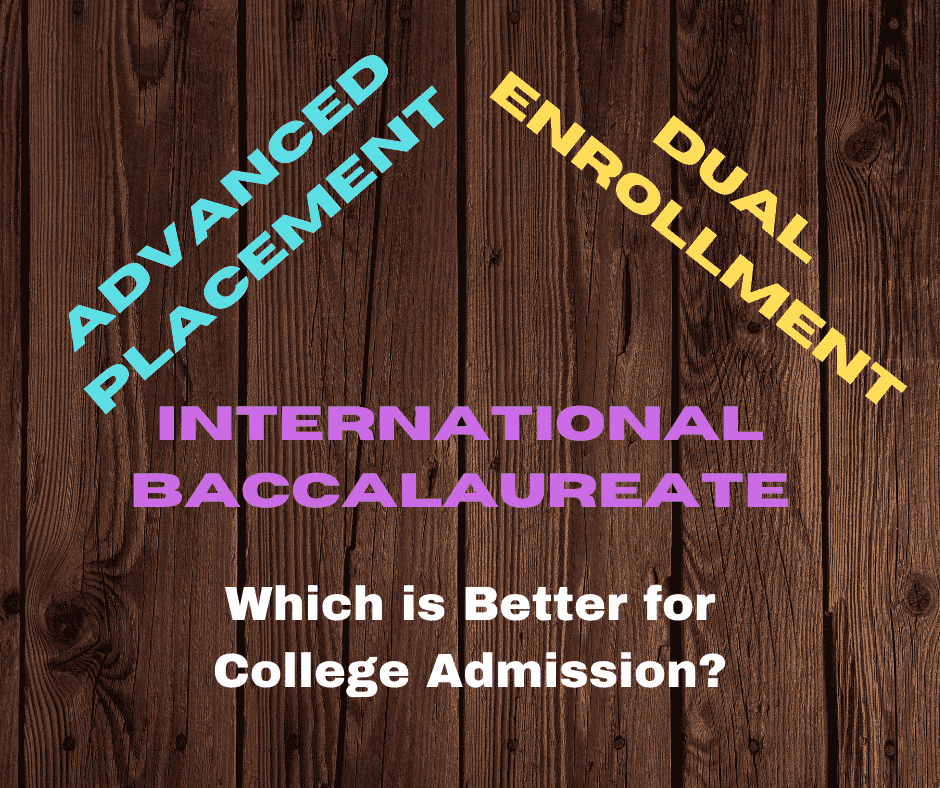IB, AP, and dual enrollment: which is better for admission to top colleges and universities in the United States. An admissions expert shares his views.
Continue readingIB exams cancelled due to Covid-19

Every spring around 200,000 students in International Baccalaureate (IB) high school programs worldwide study for and take subject exams, culminating in their final grades and graduation diplomas or certificates. This year, for the first time in history, the International Baccalaureate Organization (IBO) has decided that the IB exams are cancelled for 2020. For those students and families affected, this additional unknown adds to the stress that many had already been experiencing.
IB exams crucially connect to graduation in a way that AP and SAT/ACT exams are not. Until they take their exams, IB students only have predicted final scores. These exams are what cement their scores and become a permanent part of their educational record.
In many countries around the world, IB students receive conditional offers of acceptance to colleges and universities based on their predicted scores. Without IB exams, students and their families now worry not only about graduation, but also about university acceptances. They worry about how universities will perceive their academic achievement without the standardized measurement of their IB scores.
While we must be patient to see how it unfolds over the coming months, here is what we know so far:
- Students will still receive either a diploma or a course certificate based on their standard of work to date.
- In the absence of exams, IBO will evaluate using students’ coursework and assessments over time in combination with historical data from schools and subject data.
- The 15,000 examiners who ordinarily review IB exams will participate in this new process. Exactly what this means is still unclear. But for the remainder of the year, IBO examiners will evaluate all internal student assessments (normally teachers evaluate the internal assessments, while external examiners evaluate only the final exams).
- The goal is to still have final scores by July 5.
- IBO is communicating directly with universities through an established working group. It will give universities information on previous assessments and the process used to determine final grades for this year.
How universities are reacting to the cancelled IB exams:
- The consensus is that students will be offered places based on a combination of predicted grades, internal assessments, and recommendations. This year final scores will be calculated differently.
- Given the pandemic, the cancellations did not surprise university administrators in the US. They are now in the process of evaluating how they will flexibly approach their decisions. Colleges worry most about their own survival, so we predict that they will adapt to present realities. Many have already shown this with SAT and ACT testing changes.
- In the UK, the Department of Education has put the admissions process on a two-week moratorium starting March 23. This is to work out admission arrangements with universities to stem the pandemic panic in the wake of cancelled exams. It is in everyone’s interest that students enroll in university this fall.
- Moreover, in the UK universities accept students conditionally based on their final score results, a student who accepts an unconditional offer is free now to accept another offer. In the period known as ‘clearing,’ which starts on July 6, students will have a chance to change their minds.
- Other countries and universities are in the process of responding to the cancelled IB exams. While many details are not yet available, we predict there will be much greater flexibility this year due to these unprecedented circumstances.
So while there are no clear answers yet in sight, the International Baccalaureate Organization (IBO) weighed the pros and cons of conducting IB testing online. In the end, IBO decided that the online format carried too many risks. So IBO cancelled the exams entirely. On balance, this outcome seems to be fair. It will disrupt students’ lives the least, and remove the greater anxiety of access to and performance on these extremely important exams.
The Dark Underside of Community Service in the Quest for College Admission
Is community service in a developing country a good idea for improving your college application? Is it a good idea for the poor people the teens may serve? The answer may be “No” to both questions.
Continue readingChoosing a High School or School District To Boost College Admission Chances
Should you move to a different town or state to give your kids a better chance at a selective university? Maybe yes, but probably no.
Continue readingThe Value of Dual Enrollment Courses–A Student at William and Mary Chimes In
Want to prepare for college AND save money? Consider dual enrollment courses at your local community college
Continue readingFundamental Misconceptions About AP Courses
Patrick Mattimore, a former Advanced Placement (AP) teacher and now a Fellow at the Institute for Analytic Journalism, wrote an article in the Chronicle of Higher Education, in which he debunks 5 Fundamental Misconceptions About AP Courses (note: registration required)
Actually, it’s only four misconceptions. But nevermind. Technicality. Kind of funny, though. Anyway…
Here are the four misconceptions:
1. AP is about memorization and does not require students to think critically. Mattimore points out that critical thinking is predicated on a certain amount of domain knowledge, and that some memorization is necessary to get to higher order levels of thinking. But the AP program is not purely about memorization.
2. High-school teachers lack the expertise to teach college-level classes. Mattimore says this is sometimes true, but the College Board does try to ensure only qualified teachers deliver the curriculum through training and monitoring of syllabi. I think the College Board could do a heck of a lot more, but the costs would be prohibitive, adn the quality of American teachers is not their problem, frankly.
3. Awarding college credit reduces students’ chances for wider intellectual exploration in college. Mattimore debunks this by saying that you have to start somewhere, and the AP is a good foundation. “When we become proficient in a subject,” he writes, “our tendency is to delve further into it.” .
4. Colleges courses provide greater intellectual breadth and depth than AP courses. Having hung out in the halls of academe for a good part of my life, I can tell you that many college courses are stultifying, taught by horrid professors who may themselves be smart, but who cannot teach their way out of a paper bag. Mattimore also points out that students in AP classes get a heck of a lot more instruction in the material than in any college course.
As I have written elsewhere with regard to AP courses and International Baccalaureate (IB) courses, both can be fantastic preparation for college when taught by highly trained, capable instructors. (See more on Advanced Placement and PSEO here).
Mattimore defends the program, but also reminds us that the quality of the AP program is not consistent from state to state, school to school, or classroom to classroom.
Parents should be very cognizant that they play an important role in monitoring the quality of the AP program in their schools. Just because the label says “Advanced Placement” is no guarantee of quality.
Mark Montgomery
College Consultant
Higher GPA or Harder Courses?
Should I take easy courses to get a high GPA, or take harder courses and risk watching my average tumble? Answer: take a risk. Admissions officers will reward you.
Continue reading





